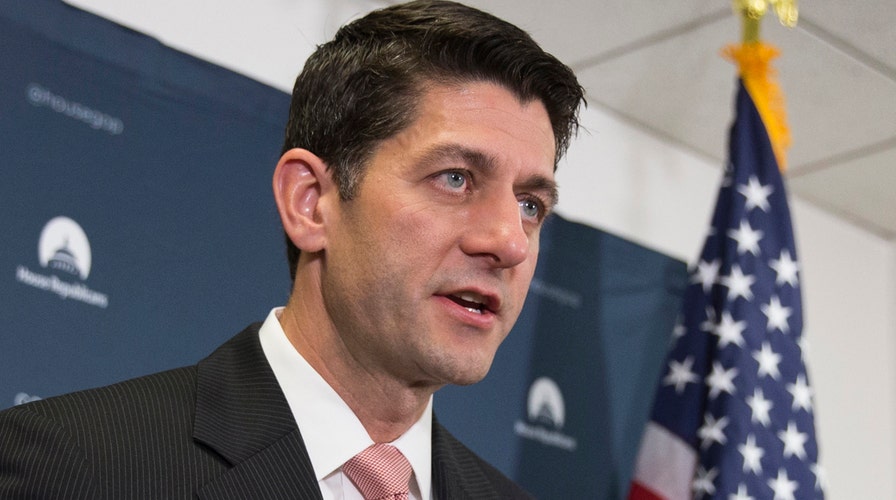Paul Ryan: Republican Party can't 'pretend' to be unified
Speaker of the House on how 'tough' Republican primary fight impacts GOP unity
Students always badger their teachers and professors about “what will be on the test.” And members of Congress are a lot like students in wanting to be prepare.
Students want a specific syllabus. They’ll read the right chapters. Memorize certain facts. Scoured their notes from January 24th because that was the lecture that was really important. And if they do that, students will probably fair OK on the exam.
No curve balls. No trick questions. Nothing out of the blue.
Members of Congress are like that, too. They too badger congressional leaders about “what will be on the test.”
Lawmakers want to know what the issues are. They need to understand the political climate. They’ve come to anticipate certain bills before committees.
And they certainly implore leadership to tell them on what they’ll be voting. Then they can pass the test.
No curve balls. No trick questions. Nothing out of the blue.
The classrooms work that way. But Congress doesn’t.
Lawmakers may hope to control the environment. But that’s not the nature of politics, considering the party running House the essentially ousted the previous speaker for trying to regulate the game too much. Many of those same members pushed for looser management in which the outcome wasn’t settled in advance.
They got that in House Speaker Paul Ryan. The Wisconsin Republican promised a more free-wheeling approach in which the result wasn’t imposed from the leadership suite.
Consider Ryan’s speech to the House on October 29, when his colleagues tapped him as speaker. Ryan called on his colleagues to “open up the process. Let people participate.”
Few lawmakers of either party could disagree with that mantra. The House is huge, stocked with 435 different viewpoints espoused by 435 people from 435 very different places. House members don’t want the power locked up in the hands of just a few. They want a piece of the action, too.
“We need to return to regular order. Now I know that sounds like process. But it’s actually a matter of principle,” said Ryan last fall. “We need to make some changes, starting with how the House does business.”
A few days later, at one of Ryan’s first press conferences, the speaker declared he’d take a hands-off approach to legislating.
“Bills will come up that may not pass,” he said. “We're not going to bottle up the process so much and predetermine the outcome of everything around here. I want the House to work its will. I think that's the way the founders envisioned it to work. And so, some things will pass, and some things won't.”
Of course, that tactic poses risks. You run the House that way and lawmakers won’t know what’s going to be on the test. And if they don’t know what’s on the test, they can’t cram the night before. Their grades may suffer.
A trick question popped up on the House floor last week. As a result, some of the lawmakers who demanded a less strict, regimen suddenly found that they preferred things the old way. They didn’t like pop quizzes. They wanted to know what would be on the test, lest their grade suffer.
The trick question is an amendment crafted by Rep. Sean Patrick Maloney, D-N.Y., an openly-gay Quebec native who represents the Catskills and Hudson River Valley, just north of New York City.
Last week, the House toiled on the first spending bill for upcoming fiscal 2017. The package funded veterans programs and military construction projects. However, Maloney’s amendment barred LGBT discrimination in federal contracting.
Most legislation that hit the House floor need what’s called a “rule” before lawmakers can start debate. The Rules Committee authors such “rules” -- which govern how much time the chamber will allocate to a given issue and what, if any, amendments will be in order.
Many Republicans criticized the leadership of former and ousted House Speaker John Boehner, R-Ohio, for locking down the legislative process and blocking the consideration of many amendments. That helps the students know what’s on the test. And if everyone studies up, they score a good grade.
Things have been looser under the Ryan regime. But in most cases for appropriations bills -- which fund the government -- the House usually permits an organic amendment process in which nearly anything goes and everyone doesn’t know what will be on the test.
The House Republican leadership brass realized they had a problem with the Maloney amendment. Yeah, yeah, yeah. All that jazz about openness. But members were going to go home with bad report cards.
Republicans could vote against the Maloney amendment and look like they opposed LGBT issues. That practically gives Democrats a narrative on a platter to use against the GOP.
Or, what if Republicans vote for the Maloney amendment -- which then incorporates the anti-LGBT provisions into the VA appropriations bill? Republicans are able to stay out of the optics argument of being anti-LGBT. But Democrats aren’t going to vote to pass the overall spending bill. So Republicans are on their own.
The Republican leadership realized it couldn’t pass the VA spending bill with the Maloney amendment attached. So they scrambled around to find just enough members to switch their vote to no. The House defeated the Maloney amendment by one vote. A few minutes later, the House approved the overall bill 241-183 on a strict, party-line vote.
But on that same bill, the House also adopted an amendment by Rep. Jared Huffman, D-Calif., to ban flying the Confederate flag in most circumstances at VA cemeteries.
The Huffman amendment was so onerous to the GOP last year that Boehner pulled all appropriations bills from the schedule. So even though the House GOP sidestepped potential disarray on the Maloney amendment last week, they embraced the Huffman language this year. A big turnaround.
“If we're going to have open rules in appropriations, which we have -- which is regular order -- people are going to have to take tough votes. I think people are acknowledging this,” crowed Ryan about adoption of the anti-Confederate flag plan. “Tough votes happen in open rules. People have got to get used to that fact. That's the way regular order works.”
But a trick question tripped up the entire House Thursday morning.
The House this week considered the second spending bill of the appropriations cycle: a $37.4 billion package to fund federal energy and water programs.
But the Maloney amendment returned. Late Wednesday night, the House voted 223-195 in favor of barring LGBT discrimination in federal contracting. All 180 Democrats who voted cast aye ballots, joined by 43 Republicans.
But that vote imperiled the energy and water measure. Adoption of the Maloney amendment posed a problem for the GOP. Like the VA bill, the Republican leadership knew they wouldn’t get help from Democrats to approve the overall bill.
So if the bill was going to pass, Republicans would have to do it on their own. Still, the inclusion of the Maloney amendment was problematic.
In congressional parlance, the Maloney amendment is what’s called a “poison pill.” It’s a provision that is tucked into a measure that is so onerous that they just can’t swallow it. The poison pill compels lawmakers to vote no on the entire piece of legislation.
And that’s what happened Friday morning.
The House rejected the energy and water plan 305-112. Only 106 Republicans voted yes, joined by a scant six Democrats. Democrats may have liked the Maloney amendment. But they opposed other provisions in the legislation dealing with the Clean Water Act and Endangered Species Act.
“The bill guts clean energy programs that would help combat the global threat of climate change,” protested Rep. Lucille Roybal-Allard, D-Calif.
The top Democrat on the Energy and Water Appropriations Subcommittee, Ohio Rep. Marcy Kaptur, argued that Republicans “could not even secure half of the votes of their members necessary for final passage.”
Kaptur pointed out that failure of the bill “puts billions of dollars in federal contracts in limbo for 2017 and beyond -- for dredging and port operations in America’s cities.”
However, some conservative groups applauded the defeat. Heritage Action didn’t like the energy and water bill’s price tag and spending priorities. But inclusion of the Maloney amendment put Heritage Action over the top.
“Republicans were right to oppose the bill as it spent far too much and affirmed President Obama’s transgender agenda,” declared Heritage Action’s Michael Needham.
But for House Republicans, LGBT issues weren’t supposed to be on the test.
Ryan has committed to individually plow through the 12 annual appropriations bills so lawmakers had the opportunity for engagement and actually legislate.
The speaker hoped to avoid fusing all of the measures into a gigantic spending package at the end of the year --called an omnibus bill. That approach has emerged as Congress’s modus vivendi. It’s precisely one of the reasons why some Republicans tired of Boehner.
But now, the threat of the Maloney amendment on every appropriations bill could very well have the same effect that the threat of the Confederate flag amendment had on last year’s spending measures.
“I said that some bills might fail because we are not going to tightly control the process and predetermine the outcome around here,” said Ryan after the energy and water plan died on the floor.
House Appropriations Committee Chairman Hal Rogers, R-Ky., described the failed vote as “merely a temporary pause.”
Ryan said the appropriations “won’t be sabotaged or derailed” and suggested if Democrats supported the Maloney amendment, they should have backed the entire bill.
But Ryan can’t have it two ways: an open process for all members and then blame the minority when members of the majority won’t go along with a provision the minority successfully latched to the bill.
There’s been chatter about requiring lawmakers to “pre-print” the amendments in advance so everyone knows what will be on the “test.” This isn’t unprecedented for appropriations bills under both Republican and Democratic control. Pre-printing certainly helps lawmakers know “what is on the test.”
“I’ll be real honest, I didn’t know if (Maloney) was talking about the (Confederate) flag or what,” Rules Committee Chairman Pete Sessions, R-Texas, said about the LBGT provision that failed on last week’s VA bill. “People didn’t know if they were talking about restrooms, bathrooms, locker rooms.”
It turns out, none of the above. And if the House does start to lock things down, it will be up to Sessions’ committee to either restrict amendments or require more information about the amendments in advance.
“What are we afraid of?” Sessions asked.
Republicans certainly don’t want to become embroiled in the culture wars. Lawmakers such as Rep. Steve Russell, R-Okla., view rejecting the Maloney amendment as “religious freedom.” But others see it as a distraction. And if lawmakers want an open process, they have to face tough votes.
But, lawmakers -- like students -- are mostly concerned about one thing: grades. And they don’t like hard tests.
That’s why rhetoric about openness may collide with knowing what’s on the test.
And everyone does better on the test when they know for what they should study.





